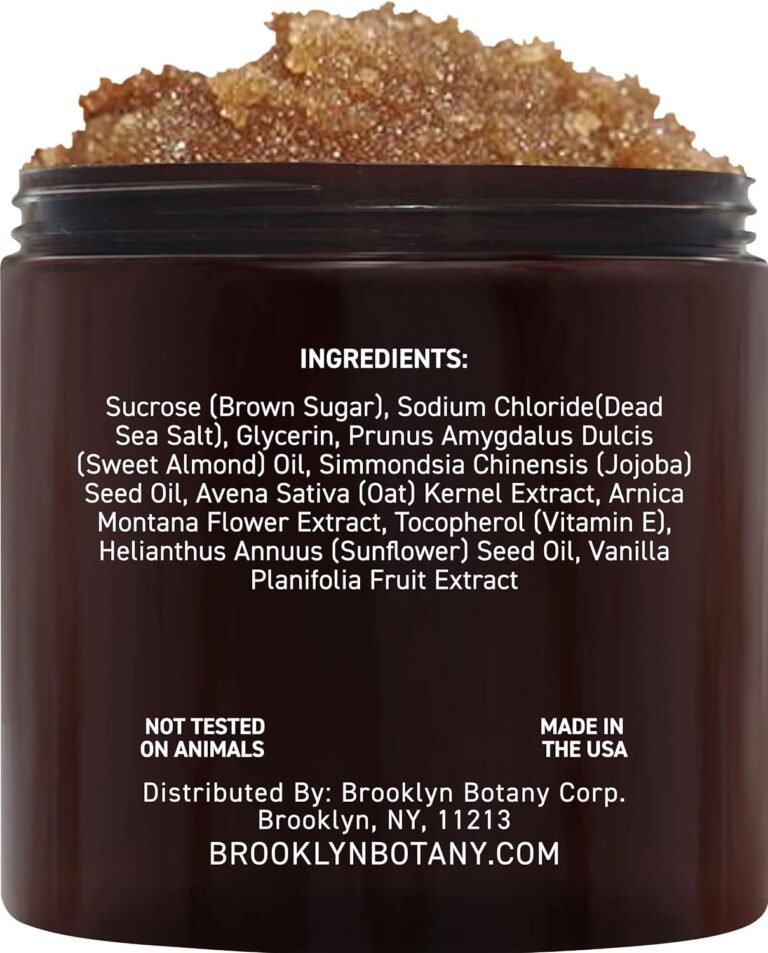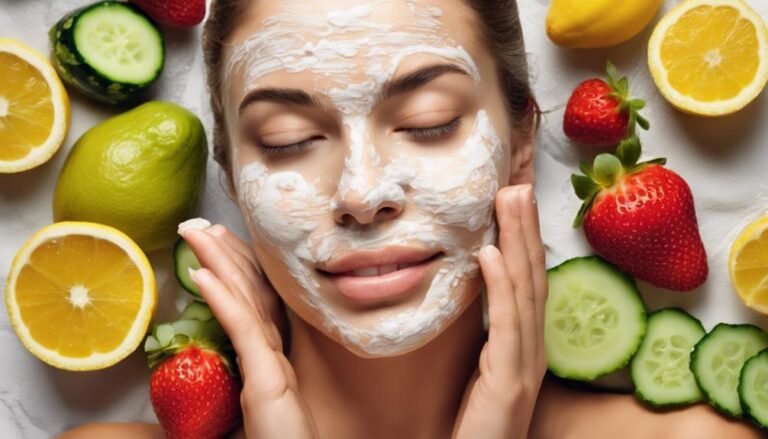How to Keep Skin Clear Naturally
If you're seeking a natural approach to maintain clear skin, adopting the right habits is key. From nourishing your skin internally with antioxidants to exploring the benefits of essential oils and herbal remedies, there are various avenues to explore. However, there's a crucial aspect often overlooked that can significantly impact your skin's clarity and overall health. So, before you jump into the specifics, consider the importance of this fundamental element that ties everything together seamlessly.
Key Takeaways
- Maintain a balanced diet rich in nutrients for clear skin.
- Stay hydrated to flush out toxins and improve skin texture.
- Use natural ingredients like coconut oil and tea tree oil for cleansing.
- Protect skin from UV rays with sunscreen and shade.
- Regular exfoliation promotes radiant skin by encouraging cell turnover.
Lifestyle Habits for Clear Skin

To maintain clear and healthy skin, adopting beneficial lifestyle habits is essential. Your skin reflects your overall health, so making smart choices can significantly impact its appearance. One crucial habit is maintaining a balanced diet rich in fruits, vegetables, whole grains, and lean proteins. These foods provide essential nutrients like vitamins A, C, E, and zinc, all of which promote skin health and combat inflammation.
Additionally, regular exercise not only improves circulation but also helps flush out toxins through sweat, contributing to clearer skin.
Getting an adequate amount of sleep is another vital aspect of a healthy skincare routine. During sleep, your body repairs and regenerates cells, including skin cells, leading to a more radiant complexion.
Stress management is also key as heightened stress levels can trigger acne breakouts and other skin issues. Engaging in relaxation techniques such as deep breathing, meditation, or yoga can help maintain clear skin by reducing stress levels.
Importance of Hydration
Maintaining proper hydration is a fundamental aspect of skincare that often goes overlooked. Hydration plays a crucial role in keeping your skin clear and healthy. When you don't drink enough water, your skin can become dehydrated, leading to dryness, flakiness, and even exacerbating skin conditions like acne. Proper hydration helps your skin maintain its elasticity, promoting a youthful and radiant complexion.
Water is essential for flushing out toxins from your body, which can otherwise accumulate and result in skin issues. By staying well-hydrated, you support the natural detoxification processes of your skin, helping to prevent breakouts and dullness.
Additionally, drinking an adequate amount of water daily can improve overall skin texture and tone.
To keep your skin clear naturally, aim to drink at least 8-10 glasses of water per day. You can also incorporate hydrating foods like fruits and vegetables into your diet to boost your skin's hydration levels. Remember, when it comes to achieving clear skin, hydration is key.
Cleansing With Natural Ingredients
Properly cleansing your skin with natural ingredients is a foundational step in establishing an effective skincare routine. Natural ingredients are gentle on your skin, avoiding harsh chemicals that can strip away natural oils and disrupt the skin's balance. Here are some beneficial natural ingredients you can incorporate into your cleansing routine:
| Natural Ingredient | Benefits |
|---|---|
| Coconut Oil | Hydrating and antimicrobial |
| Honey | Antioxidant and antibacterial |
| Aloe Vera | Soothing and anti-inflammatory |
| Tea Tree Oil | Anti-acne and antimicrobial |
| Witch Hazel | Astringent and anti-inflammatory |
These ingredients work synergistically to cleanse your skin while providing additional benefits like hydration, acne-fighting properties, and soothing effects. Whether you have oily, dry, or sensitive skin, there are natural options suitable for you. Experiment with these ingredients to find the perfect combination that leaves your skin feeling refreshed and rejuvenated.
Nourishing Your Skin From Within
Nourishing your skin from within is a key aspect of achieving a clear and radiant complexion. To ensure your skin gets the nourishment it needs, consider the following tips:
- Hydrate: Drinking an adequate amount of water helps keep your skin hydrated and plump, reducing the appearance of fine lines and wrinkles.
- Eat a Balanced Diet: Incorporate foods rich in antioxidants, vitamins, and minerals like fruits, vegetables, nuts, and seeds. These nutrients help repair and protect your skin from damage.
- Omega-3 Fatty Acids: Include sources of omega-3 fatty acids in your diet such as fatty fish, flaxseeds, and walnuts. These healthy fats help maintain skin elasticity and hydration.
- Limit Sugar and Processed Foods: Excessive sugar consumption and processed foods can lead to inflammation in the body, which may manifest in skin issues like acne. Opt for whole foods to support skin health from the inside out.
The Power of Sun Protection

To shield your skin from harmful UV rays and maintain its health, sun protection is essential. Sun exposure not only leads to premature aging but also increases the risk of skin cancer.
When choosing a sunscreen, opt for a broad-spectrum formula with SPF 30 or higher to effectively block both UVA and UVB rays. Remember to apply sunscreen generously and reapply every two hours, especially when outdoors or after swimming or sweating.
Additionally, seek shade during peak sun hours, usually between 10 a.m. and 4 p.m., to reduce direct exposure. Wearing protective clothing, sunglasses, and wide-brimmed hats can further safeguard your skin from sun damage.
Embracing these sun protection practices not only helps prevent sunburns and skin damage but also supports your skin's overall health and clarity. By making sun protection a daily habit, you're taking a proactive step towards maintaining clear and radiant skin naturally.
Exfoliation for Radiant Skin
To maintain radiant and clear skin, incorporating exfoliation into your skincare routine is key. Exfoliation helps remove dead skin cells, unclog pores, and promote cell turnover, revealing smoother and brighter skin. Here are some tips to exfoliate effectively:
- Choose the Right Exfoliant: Opt for a gentle exfoliant suited for your skin type, such as a chemical exfoliant with AHAs or BHAs for sensitive skin or a physical scrub with fine particles for normal skin.
- Exfoliate Regularly: Aim to exfoliate 2-3 times a week to prevent over-exfoliation, which can irritate the skin. Adjust the frequency based on your skin's response.
- Be Gentle: Avoid aggressive scrubbing, especially if you have sensitive skin. Gently massage the exfoliant in circular motions for best results.
- Moisturize After Exfoliation: After exfoliating, follow up with a hydrating moisturizer to restore moisture and maintain skin barrier function.
DIY Face Masks for Clear Complexion
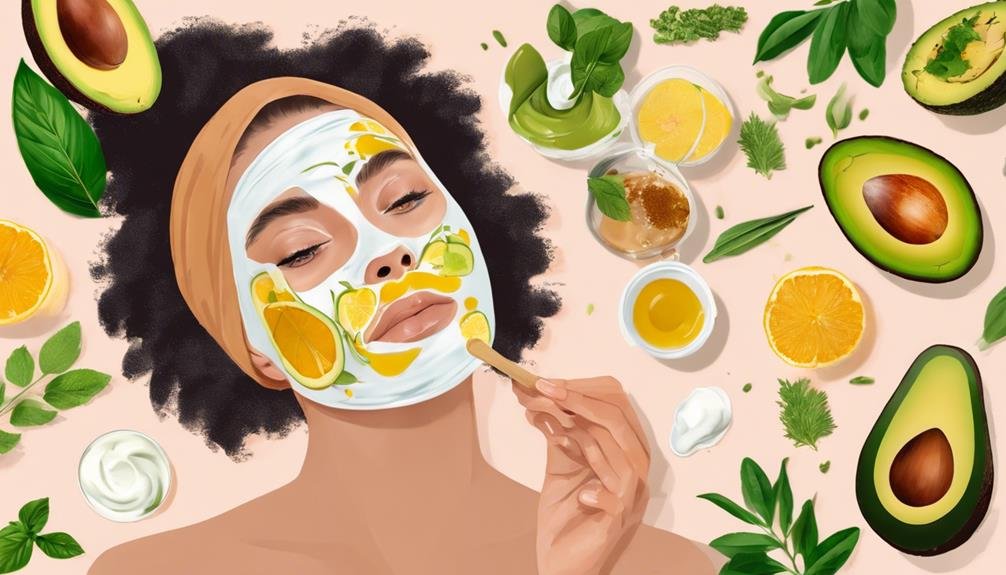
For achieving a clear and glowing complexion, incorporating DIY face masks into your skincare routine can be highly beneficial. These masks aren't only fun to make but also effective in addressing specific skin concerns. Ingredients like honey, yogurt, avocado, and turmeric can work wonders for your skin.
Honey is a natural humectant, locking in moisture and promoting a plump, hydrated complexion. Yogurt contains lactic acid, which gently exfoliates and brightens the skin. Avocado is rich in antioxidants and healthy fats that nourish and soothe the skin, leaving it soft and supple. Turmeric has anti-inflammatory properties, reducing redness and calming breakouts.
To create a DIY face mask, simply mix these ingredients together, apply the mixture to your face, leave it on for about 15-20 minutes, and then rinse off with warm water. Using these masks 1-2 times a week can help you achieve a clearer complexion naturally. Remember to patch-test new ingredients to ensure they work well with your skin.
Stress Management for Skin Health
Clear skin isn't just about what you put on your face; it's also influenced by factors like stress levels. Managing stress is crucial for maintaining healthy skin. Here are some tips to help you manage stress effectively:
- Practice Relaxation Techniques: Incorporate activities like deep breathing, meditation, or yoga into your daily routine to reduce stress levels.
- Get Adequate Sleep: Lack of sleep can increase stress and lead to skin issues. Aim for 7-9 hours of quality sleep each night.
- Exercise Regularly: Physical activity is a great way to relieve stress and improve overall well-being. Find an exercise that you enjoy and make it a habit.
- Maintain a Healthy Diet: Eating a balanced diet rich in fruits, vegetables, and whole grains can help regulate stress levels and promote clear skin.
Benefits of Essential Oils
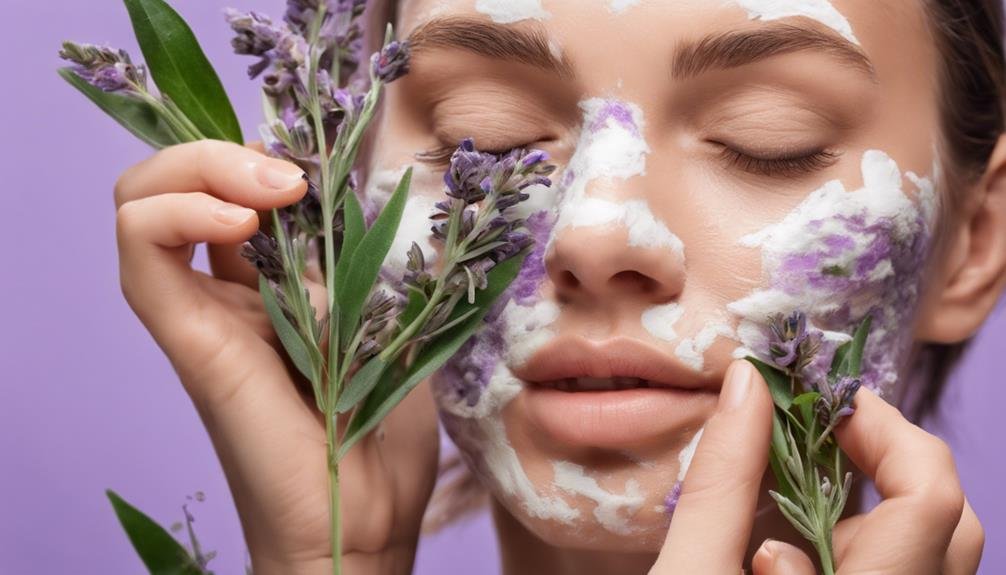
A variety of essential oils have been found to offer numerous benefits for skin health and overall well-being. Essential oils like tea tree oil, lavender oil, and rosehip oil have anti-inflammatory and antimicrobial properties that can help reduce acne breakouts and calm irritated skin. Tea tree oil, in particular, is known for its ability to fight acne-causing bacteria, while lavender oil can soothe skin inflammation and redness. Rosehip oil is rich in antioxidants and essential fatty acids that promote skin regeneration and hydration.
Furthermore, essential oils like frankincense, geranium, and chamomile are often used for their anti-aging properties. Frankincense oil can help reduce the appearance of wrinkles and improve skin elasticity, while geranium oil balances oil production and tightens skin. Chamomile oil is gentle and soothing, making it ideal for sensitive skin.
When using essential oils on your skin, it's essential to dilute them with a carrier oil and perform a patch test to check for any allergic reactions. Incorporating these oils into your skincare routine can provide natural and effective solutions for maintaining clear and healthy skin.
Herbal Remedies for Acne
To address acne concerns effectively, exploring herbal remedies can offer a natural and gentle approach to managing breakouts and promoting clearer skin. Herbal remedies have been used for centuries to help with various skin conditions, including acne.
Here are some herbal options you can consider incorporating into your skincare routine:
- Tea Tree Oil: Known for its antimicrobial properties, tea tree oil can help reduce acne-causing bacteria on the skin.
- Calendula: This herb has anti-inflammatory and antibacterial properties that can soothe irritated skin and reduce redness associated with acne.
- Green Tea: Rich in antioxidants, green tea can help reduce sebum production and inflammation, making it beneficial for acne-prone skin.
- Lavender: With its calming and antibacterial properties, lavender oil can help reduce acne flare-ups and promote overall skin health.
Detoxifying Your Skincare Routine
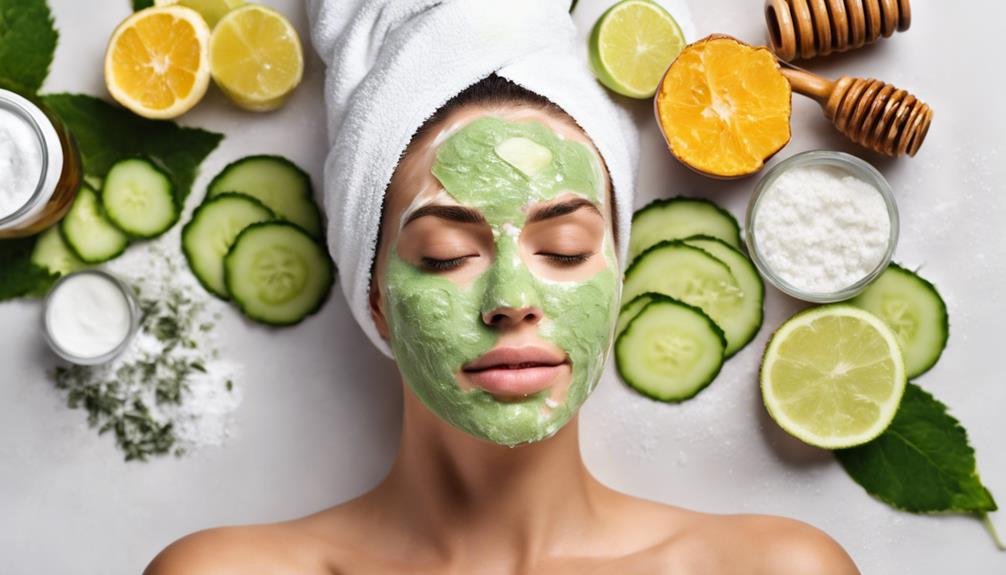
Exploring ways to enhance your skincare routine by incorporating detoxifying elements can amplify the benefits of herbal remedies for acne. Detoxification involves the removal of impurities and toxins that can accumulate on your skin from environmental factors like pollution and skincare products laden with chemicals. By detoxifying your skincare routine, you allow your skin to breathe and function optimally, promoting a clearer complexion and healthier skin overall.
One effective way to detoxify your skincare routine is by opting for natural and organic products that are free from harsh chemicals, artificial fragrances, and preservatives. Look for ingredients like activated charcoal, clay, green tea, or witch hazel, known for their detoxifying properties. These ingredients can help draw out impurities, absorb excess oils, and soothe inflammation, all while nourishing your skin with beneficial nutrients.
Incorporating a weekly detox mask or exfoliating treatment can also help eliminate dead skin cells and unclog pores, allowing your skin to better absorb the benefits of herbal acne remedies. Remember, a clean and detoxified canvas is essential for maximizing the effectiveness of your skincare routine.
Sustainable Beauty Practices
Enhancing your skincare routine with sustainable beauty practices not only benefits your skin but also contributes to a healthier planet. By incorporating eco-friendly habits into your beauty regimen, you can make a positive impact on both your skin's health and the environment. Here are some sustainable beauty practices to consider:
- Choose cruelty-free and vegan products: Opt for skincare items that aren't tested on animals and don't contain any animal-derived ingredients. This supports ethical practices and reduces harm to wildlife.
- Use refillable or recyclable packaging: Select products that come in refillable containers or packaging that can easily be recycled. This helps reduce waste and minimizes the environmental footprint of your skincare routine.
- Support sustainable brands: Look for beauty companies that prioritize sustainability in their production processes, sourcing, and overall ethos. By supporting these brands, you encourage more eco-conscious practices within the beauty industry.
- DIY skincare: Experiment with creating your skincare products using natural ingredients like honey, avocado, or coconut oil. This not only reduces packaging waste but also allows you to tailor products to your skin's specific needs.
Frequently Asked Questions
Can Certain Foods Cause Breakouts?
Certain foods can cause breakouts due to their impact on hormone levels and inflammation. Excessive consumption of dairy, sugar, and high-glycemic foods may contribute to acne. It's essential to be mindful of your diet's effects on your skin.
How Often Should I Change My Pillowcase?
To keep your skin clear naturally, change your pillowcase every 2-3 days. This helps prevent dirt, oil, and bacteria buildup that can transfer to your skin while you sleep. Fresh pillowcases promote healthier skin.
Is Sweating Good or Bad for Skin?
Sweating is beneficial for skin as it helps regulate body temperature and flush out toxins. However, excess sweat can clog pores and lead to breakouts. Ensure proper cleansing after sweating to maintain clear skin.
Can Weather Affect Skin Clarity?
Weather can impact skin clarity. Extreme cold or dryness can lead to flakiness and irritation, while humidity may trigger breakouts. Protect your skin with appropriate moisturizers and skincare routines tailored to the weather conditions you're facing.
Should I Avoid Touching My Face?
Avoid touching your face, as it can transfer bacteria and oils, leading to breakouts. Practice good hygiene by washing hands frequently and using clean tools for skincare. Keep your hands off to maintain clearer skin naturally.
Conclusion
Congratulations, you are now equipped with the knowledge to achieve clear skin naturally. Embrace the power of hydration, natural ingredients, and sustainable beauty practices to unlock your skin's full potential. Say goodbye to harsh chemicals and hello to a radiant complexion that shines from within. Remember, clear skin isn't just a goal, it's a lifestyle. Keep glowing, beauties!



